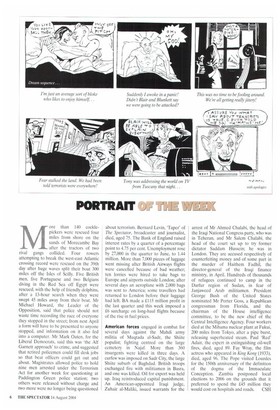M ore than 140 cocklepickers were rescued foul miles from shore
on the sands of Morecambe Bay after the tractors of two rival gangs collided. Four rowers attempting to break the west-east Atlantic crossing record were rescued on the 39th day after huge waves split their boat 300 miles off the Isles of Scilly. Five British men, five Portuguese and two Belgians diving in the Red Sea off Egypt were rescued, with the help of friendly dolphins, after a 13-hour search when they were swept 45 miles away from their boat. Mr Michael Howard, the Leader of the Opposition, said that police should not waste time recording the race of everyone they stopped in the street; from next April a form will have to be presented to anyone stopped, and information on it also fed into a computer. Mr Mark Oaten, for the Liberal Democrats, said this was the Alf Garnett approach' to crime, and suggested that retired policemen could fill desk jobs so that beat officers could get out and about. Magistrates allowed police to hold nine men arrested under the Terrorism Act for another week for questioning at Paddington Green police station; two others were released without charge and two more were no longer being questioned
about terrorism, Bernard Levin, 'Taper' of The Spectator, broadcaster and journalist, died, aged 75. The Bank of England raised interest rates by a quarter of a percentage point to 4.75 per cent. Unemployment rose by 27,000 in the quarter to June, to 1.44 million. More than 7,000 pieces of luggage went missing after British Airways flights were cancelled because of bad weather; ten lorries were hired to take bags to Europe and airports outside London; after several days an aeroplane with 2,000 bags was sent to America; some travellers had returned to London before their luggage had left. BA made a £115 million profit in the last quarter and this week imposed a £6 surcharge on long-haul flights because of the rise in fuel prices.
American forces engaged in combat for several days against the Mahdi army militia of Muqtada al-Sadr, the Shiite populist; fighting centred on the large cemetery in Najaf. More than 360 insurgents were killed in three days. A curfew was imposed on Sadr City, the large Shiite suburb of Baghdad. British troops exchanged fire with militiamen in Basra, and one was killed. Oil for export was held up. Iraq reintroduced capital punishment. An American-appointed Iraqi judge, Zuhair al-Maliki, issued warrants for the
arrest of Mr Ahmed Chalabi, the head of the Iraqi National Congress party, who was in Teheran, and Mr Salem Chalabi, the head of the court set up to try former dictator Saddam Hussein; he was in London. They are accused respectively of counterfeiting money and of some part in the murder of Haithem Fadhil, the director-general of the Iraqi finance ministry, in April. Hundreds of thousands of refugees continued to camp in the Darfur region of Sudan, in fear of Janjaweed Arab militiamen. President George Bush of the United States nominated Mr Porter Goss, a Republican congressman from Florida, and the chairman of the House intelligence committee, to be the new chief of the Central Intelligence Agency. Four workers died at the Mihama nuclear plant at Fukui, 200 miles from Tokyo, after a pipe burst, releasing superheated steam. Paul 'Red' Adair, the expert in extinguishing oil-well fires, died, aged 89. Fay Wray, the film actress who appeared in King Kong (1933), died, aged 96. The Pope visited Lourdes for the 150th anniversary of the definition of the dogma of the Immaculate Conception. Zambia postponed local elections to 2006 on the grounds that it preferred to spend the £45 million they would cost on hospitals and roads. CSH


























































 Previous page
Previous page